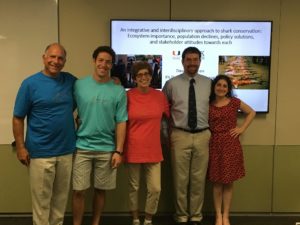
After a little more than 5 years of hard work, I’ve officially completed my Ph.D.! You can read my dissertation (“An Integrative and Interdisciplinary Approach to Shark Conservation: Policy Solutions, Ecosystem Role, and Stakeholder Attitudes”) online here in its entirety.
In case there are some among you who don’t really want to read a 281 page dissertation but are curious about what I found, I’ve prepared this blog post to summarize my key conclusions. (Note: this does not include every conclusion. Some are aggregated together, and some more technical conclusions are omitted for this summary).
Read More “37 things I learned about shark ecology and conservation for my dissertation” »


